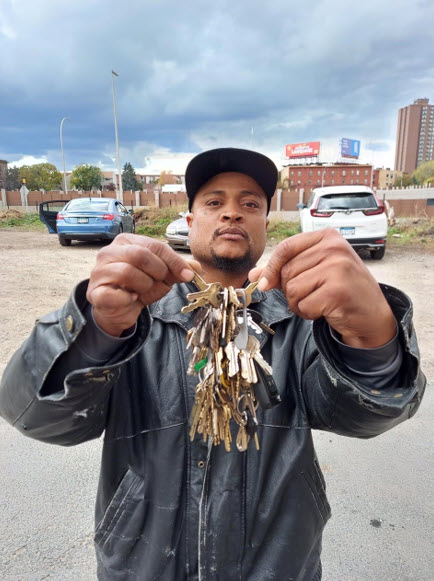
You don’t question DeWayne. He doesn’t like his street name, so I won’t use it here. Suffice it to say, he has respect on both sides of the fence outside Peace House, where he’s a stalwart. Yes, he can go off on Minnesota’s quiet racism and talk about leaving. But he is not wrong.
He is welcomed places far from here. The “blighted” districts of St. Louis where he grew up. The cultured quarters of glass artist Dale Chihuly, where he once worked. He is walking testament to the truth: never underestimate people.
Listen, and let them astonish you.
We were talking classic cars we had known. I pulled up a picture of a ’62 Ford Galaxie Sunliner my father had purchased after we moved to a new town. Talk about torture. I was 15 and too young to drive.
Talk about privilege.
A guy in my class was 16 and my father, knowing something about trying to fit in, allowed Bill to drive it with me and some of my new friends.
Then my dad sold it.
DeWayne identified the car immediately. He told his own story about seeing a ’62 Galaxie for sale in St. Louis. How he had just enough money in his bank account, and how it cost much more to fix it up. His car was a different shade of blue, but Ford did that back in the day.
My story was all vapor. A memory of my father, Viking blue paint and baby moon hubcaps.
DeWayne brought receipts.
In my novel INHABITED, I wrote about a homeless character who loses his keys, “Most of them keys to locks changed, to padlocks cut, to whole buildings gone.”
DeWayne carries his history with him, a panoply of metal. A litany of loss. I would not mess with a man who had that at his hip.
From the agglomeration of his past, he showed me the keys to his Galaxie. (Yes, the door key and the ignition.)
I cut his hair down to the scalp. Before or after, it isn’t important.
Next time maybe we’ll talk about why Ford didn’t call it the Galaxy.
Next time takes time.
by Charlie Quimby
